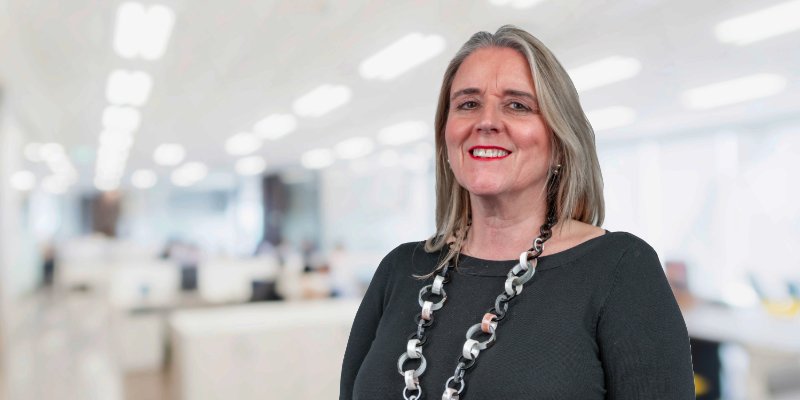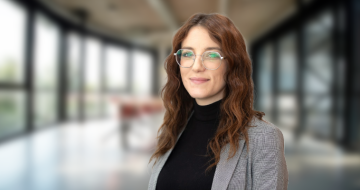Charlotte Wanendeya, Head of Law at BPP (London) discusses dealing with generational conflict in the workplace and how employers can best support Gen Z lawyers

Charlotte Wanendeya, Head of Law at BPP (London), has over 30 years of experience guiding the newest generations of lawyers through the LPC, SQE and Bar Course. Having studied Anglo-French law at King’s College, London, and Sorbonne, Paris, she began her career as a trainee at Clifford Chance. However, after 5 years at the magic circle outfit, Charlotte was ready for a change.
“I realised what I liked best about my job were the educational and training aspects. So, I moved into professional higher education where I have worked ever since,” she tells me. I am keen to know how the legal profession has changed over the course of Charlotte’s career. How different is life as a lawyer now compared to her time at Clifford Chance? “One massive change, of course, is pre-internet and post-internet,” comes Charlotte’s immediate response. “When I was practising, there was pretty much no internet or email – it was embryonic. We had secretaries and dictaphones, and there was certainly no Google!”
Another significant change she mentions is the awareness around mental health issues in the workplace. “In my own experience as a Gen X-er, mental health wasn’t talked about in the office at the start of my career,” Charlotte explains. “The pace of life, and in particular, work life, has become so much faster and the consequence for the younger generation, Gen Z, has been a spike in anxiety and mental health problems. That has brought something entirely new to the workplace.”
It’s not all bleak, however. “Gen Z have a stronger sense of balance which is a very good thing,” Charlotte notes. “Not everybody is necessarily aspiring to be a partner in a law firm. Some would rather prioritise spending time with their family over a massive salary.” She also highlights flexible working options as a positive change Gen Z will experience in their careers. “Boomers and Gen X never had the option of working from home. Before Covid, that flexibility wasn’t available. It wasn’t an option,” she recalls. “One of the things I struggled with early in my career was finding that balance whilst raising a family as a single parent. Working from home even one day a week would have helped a great deal.”
Charlotte elaborates on the factors affecting Gen Z’s approach to work. “These are what I call the five Cs,” she says. “Covid, climate change, cost of living, cyberspace and conflict. These factors have meant Gen Z have a different way of thinking and communicating.” She uses speaking on the phone as an example, “While we must be careful not to stereotype or pigeonhole people, those in Gen Z are much less likely to want to pick up the phone than their older colleagues, for whom this was the norm in the workplace.”
These generational differences have the potential to cause friction at work, according to Charlotte. “There are currently four generations in the workplace, Boomers, Gen X, Gen Y – also known as millennials – and Generation Z,” she explains. “Each generation has its own expectations and communication styles, which does cause some head-butting in the workplace. We need to address these differences so that all four generations can work smoothly together. This is what makes business sense.”
In addition to her role at BPP, Charlotte is also the vice chair of the City of London Law Society Training Committee, collaborating with corporate law firms to discuss training and support initiatives for the next generation of solicitors. Charlotte stresses the importance of conversations between professional higher education providers and law firms, “It’s important to get everybody around the table and promote that collaborative spirit,” she says. “Everyone is facing the same issues and trying to crack the same problems, so, in my view, a collaborative approach is the way to go.”
Seeing professional education providers as a bridge between Gen Z students and their future employers, Charlotte tells me, “We are providing law firms and chambers with the next generation of lawyers. That is a huge privilege as well as a responsibility. We have experience teaching this generation and we know how they think, learn and tick, as well as the challenges they’re facing.” She goes on, “We need to work together to support this generation and help them thrive – they are the future.”
As well as collaborations between law schools and employers (for placements and work experience), with the rapid development of Generative AI, Charlotte believes that also engaging and collaborating with tech experts would help Gen Z get ready for the workplace:
“We need to prepare students for the new technology that will be central to their careers (for example, understanding the basics of document management systems, prompting skills, data literacy and cybersecurity risks. To make that happen, we need more collaboration with the tech experts who are designing these tools.
So, how does BPP prepare its students for a rapidly evolving workplace? “At BPP, we are continually focused on making sure that what students learn in the classroom – including the skills they learn – aligns with how they’re assessed and, most importantly, aligns to the work they will be doing in their future careers as lawyers, to ensure they are practice-ready,” Charlotte responds. “For example, at BPP, we offer Essentials for Practice modules on our SQE Prep courses which are created in collaboration with law firms which mimic the work students will actually be doing once they get into practice.”
As we wrap up our discussion, I ask what Charlotte’s advice would be to employers and young lawyers navigating generational differences in the workplace. “Listen – and be kind!,” is her response. “That would be my advice to everyone. Listening and understanding goes both ways. We must always appreciate things from a different perspective to realise that we can work together effectively.”
Charlotte Wanendeya will be speaking on BPP’s panel, ‘Gen Z: expectations and realities’ at LegalEdCon 2025, Legal Cheek’s annual future of legal education and training conference, which takes place in-person on Thursday 15 May at Kings Place, London. Final release tickets for the Conference can be purchased here.
About Legal Cheek Careers posts.


